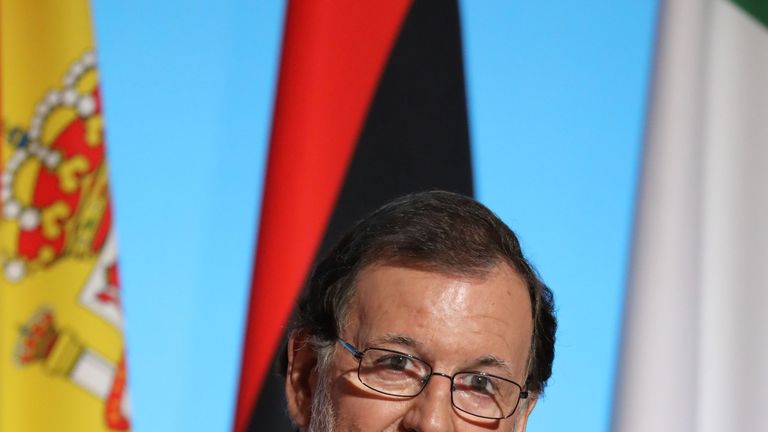Spanish media coverage of referendum reflects polarised society
Catalonia's referendum on independence lays bare some long-standing divisions within Spanish society, writes Sky's Dan Whitehead.
Saturday 7 October 2017 05:11, UK
From outside Spain, trying to understand the ins and outs of Catalonia's bid for independence is hard enough. Inside, partisan state broadcasters vehemently push their side of the story, meaning finding a balanced view isn't always easy.聽
Media coverage over the last week in Spain has been an example of how national and regional state broadcasters reflect a polarised society.
"There is a major difference in the media between the UK and Spain. In the UK, TV news tends to be more neutral, whereas in Spain that is not the case," explains Adrian Pierce, a lecturer in Spanish and Latin American history at University College London.
"I lived in Spain for five years and I found it was very difficult to get any kind of balanced prospective if one only watched one of the major national state channels. An example is the question of demonstrations.
"Part of what has been going on in Catalonia at the moment has been based on massive demonstrations of more than a million and a half people in a region that only has a population of about 7.5 million. So you've had up to 20% of the population out on the streets and yet the way those demonstrations are reported is radically different - the numbers presented on the state channels are much lower."
On the day of the referendum, Spain's public broadcaster TVE came under criticism for towing the government line and not giving enough coverage to police violence.
They were editorial decisions which even led to anger amongst its own staff in Catalonia.
While Catalonia's broadcaster TV3 focused its bulletins far more on the violence. TV3's London correspondent Sergi Mulero told Sky News criticism is to be expected.
"As a public broadcaster, TV3, as other broadcasters in Spain, faces criticism in our daily work and it's fair because we are a public broadcaster and we need to listen to our audiences," he said.
"The Spanish government it is facing a lot of criticism because we have seen scenes of violence on the streets of Catalonia and the international media has reported these scenes live and the Spanish government is having trouble justifying this situation."
The Spanish government has now apologised to those who were injured in last week's violence.
But Inigo Mendez de Vigo, Spain's culture minister and government spokesman, told a news conference the government still has issues with the number of injured circulating in the media.
"It is true that in the international press, in the press there has been, there have been many of stories about this. We have all seen them, of people who said that they had been assaulted and it turned out that they hadn't been, of figures of injured people that it seems do not correspond to reality," he said.
Spain's media landscape is diverse and varied.
But Adrian Pierce says many of the bigger networks act as an echo chamber, meaning people are accessing news sources which simply reflect their own beliefs:
"It is an echo chamber that just reflects back people's views at a magnified volume but it is more than that - there is something special in Spain," he said.
"What's most striking to me is across a whole range of social and political sectors and across the whole spectrum there really is only one discourse and that is that the separation of Catalonia from Spain is unacceptable, that what we're witnessing is a manipulation of the population by radical politicians in the region and that what has to be upheld is the constitution and rule of law and that is all there is to be said."
Gaining a clear picture of events over the last week is made all the harder with the fake news going viral.
Photos of alleged demonstrations and injuries in Catalonia have been widely shared, many of them taken years ago and completely unrelated.
For Spanish audiences - who and what to believe remains a challenge.
At a time when unity and agreement are hard to find, the Spanish coverage may only reinforce divisions.






